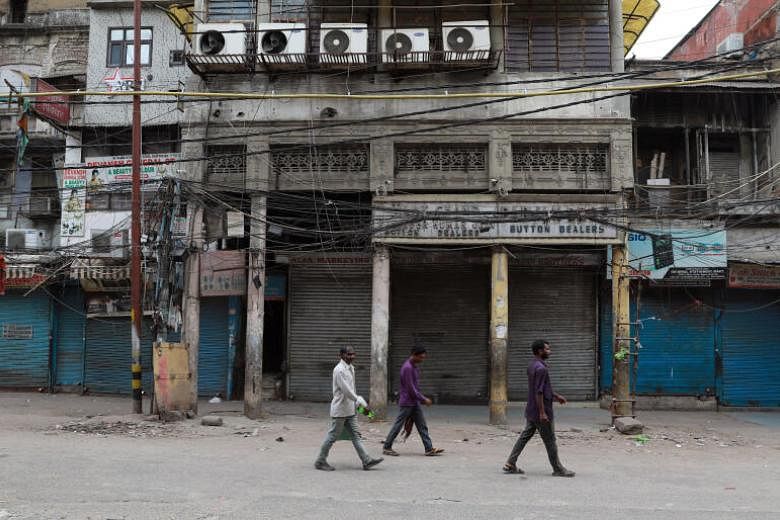BANGALORE - India is facing an epidemic of fake news and misinformation about the coronavirus.
On Saturday (March 21), Tamil film superstar Rajinikanth posted a video on Twitter asking Indians to follow Prime Minister Narendra Modi's call for a nationwide curfew the following day.
The actor, with more than 5.7 million followers on Twitter, added: "India is currently in Stage 2. If people don't contract the virus which lives outside in public spaces frequented by people for 12-14 hours, we can stop it from going to Stage 3."
About four hours later, Twitter took down the post for violating its internal rules. But the rumour about the potential impact of the curfew, in circulation even before Rajinikanth's tweet, continued to spread.
Mr Pawan Kalyan, a Telugu actor and politician, and Mr Sonu Nigam, a Bollywood singer, both made similar claims on their social media accounts.
Many Indians stayed indoors during a 14-hour nationwide public curfew that began at 7am on Sunday, the government issued an advisory to various state governments for a prolonged lockdown in 75 districts with confirmed Covid-19 cases.
Last night, PM Modi ordered the entire country to be locked down.
In his first address, Mr Modi had asked Indians to show their appreciation for front-line medical workers by clapping and banging plates on Sunday evening. But on social media and WhatAapp, this demonstration of gratitude was made out to be a virus-beating tactic.
One message on Whatsapp read: "Clapping, conch blowing by (1.3 BILLION) people at the same time will create so much vibrations that virus will lose all potency."
The rumour appeared to be widespread enough for India's Press Information Bureau's fact-checking team to respond: "No! The vibration generated by clapping together will NOT destroy #Coronavirus infection."
On Sunday, soon after the applause died down, another viral WhatsApp message read: "NASA satellite videos live telecast have shown that the coronavirus is retreating in India thanks to the people's efforts."
The next day, Amitabh Bachchan, a Bollywood superstar with more than 40 million Twitter followers, tweeted: "An opinion given... Clapping shankh (conch) vibrations reduce/destroy virus potency... Cumulative vibration betters blood circulation."
Facing outrage from medical professionals and journalists, he deleted the tweet later that day.
Fact checkers and medical experts say the rash of rumours and false information online are not just laughable, but can also seriously hinder India's efforts to control the pandemic.
"We are not just fighting an epidemic; we're fighting an infodemic," said World Health Organisation's director-general Tedros Adhanom Ghebreyesus a month ago.
Dr Sumaiya Shaikh, a Sweden-based neuroscientist and science editor for the Indian fact-checking website altnews, takes it a step further, calling it an "misinfodemic".
"People are believing this - so many of them went outside in processions, dancing on the streets on Sunday evening to celebrate the end of the virus. They don't understand the meaning of social distancing, which is right now the only way to stop the spread of the coronavirus.
"Celebrities should be responsible, and use their huge influence to only share verified information," she said.
Some government officials have been reckless too.
On March 19, Mr Ashwini Kumar Choubey, Minister of State for Health in the central government, told journalists that exposure to the sun would kill the virus.
One of the government's first responses to the pandemic came in January, when a central ministry to promote indigenous alternative medicines published a list of traditional drugs to prevent infection from the virus.
Dr Shaikh said: "None of these drugs work. They have never been tested even for treating the symptoms, and there is no peer-reviewed research on them for Coronavirus. Sadly, the majority of the fake news in the world is coming from India, and from politicians and ministries."
Some misinformation might have caused panic.
On March 18, a message on Facebook and WhatsApp that referred to Dr Naresh Trehan, a well-known doctor and the chairman of Medanta Hospital, said: "Just got a news from Dr Trehan's office... that India is going to declare a National Emergency in a day or two. Keep enough ration, medicines and enough cash."
Medanta was forced to tweet in response: "Please disregard this message. This can lead to panic buying, hoarding and stampeding banks. This is not the need of the hour."
India is WhatsApp's biggest market, with an estimated 400 million users. The company announced last week that it was setting up a coronavirus information hub in partnership with the WHO, the UN Children's Fund and the UN Development Programme to offer guidance and resources for users.
It also donated US$1 million (S$1.45 million) to the Poynter Institute's International Fact-Checking Network.
India's Ministry of Electronics and IT has asked social media companies to promptly remove false information and to tell their users not to publish such content.
The government has set up "Mygov Corona", an automated chatbot on WhatsApp, to provide information such as symptoms of coronavirus infection, precautions and helpline numbers. Last night, PM Modi also warned Indians against believing rumours and self-medicating.












